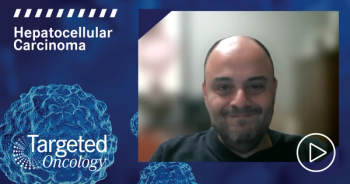
Case 1: A Diagnosis of Solitary HCC ≥3 cm
Expert perspectives on the case of a 70-year-old man who presents and is diagnosed with solitary hepatocellular carcinoma measuring greater than 3cm.
Episodes in this series

Transcript:
Aparna Kalyan, MD: Thank you for joining us for this Targeted Oncology™ Virtual Tumor Board®, which is focused on hepatocellular carcinoma [HCC]. My colleagues and I will review 3 clinical cases. We’ll discuss an individualized approach to treatment of each patient and review the key clinical data that inform our decisions. My name is Aparna Kalyan. I’m an associate professor of medicine from the Robert H. Lurie Comprehensive Cancer Center of Northwestern University [in Chicago, Illinois]. I’m joined by Dr Ben George, the William F. Stapp endowed chair, the medical director in the clinical trials office, and an associate professor of medicine in the division of hematology and oncology at Medical College of Wisconsin [in Milwaukee, Wisconsin]; Dr Edward Kim, who’s the director of interventional oncology and a professor of radiology and surgery in the division of vascular and interventional radiology at Mount Sinai Hospital [in New York, New York]; and Dr Parvez Mantry, executive medical director of clinical research at Methodist Health System [in Dallas, Texas]. Welcome, everybody.
Let’s get started with our first case. I’m going to pull up the case for us to start discussion.
Ben George, MD: We have a 70-year-old man who was referred by his primary care doctor for suspected cirrhosis. He presented with right flank and abdominal pain, jaundice, fatigue, and some swelling in his lower extremities. He had hepatitis C infection, treated with interferon 25 years ago. Hypertension controlled on ACE inhibitor. No type 2 diabetes heart failure or other comorbid conditions. He is retired, lives with wife of 40 years, and drinks about 3 alcoholic drinks daily. His work-up demonstrated multiple nodules detected on ultrasound, all less than 10 mm. Alpha-fetoprotein [AFP] was 425 ng/mL. Hepatitis panel: negative for hepatitis A and B+. For hepatitis C, viral load was undetectable. Bilirubin level was 1.5 mg/dL. He had mild transaminitis. PT [prothrombin time] was an INR [international normalized ratio] of 1.4. He had normal platelets and normal red blood cells and white blood cells. End-organ function looks good from a kidney function standpoint. MRI detected a solitary lesion of 4.2 cm next to the portal vein, with possible portal vein invasion. We have a BCLC-A [Barcelona Clinic Liver Cancer stage A] hepatocellular carcinoma and Child-Pugh class A. The patient has a good performance status ECOG 0.
Aparna Kalyan, MD: Thank you, Dr George. With that in mind, I want to get our panel involved with some discussion questions. The first is, do you think you would consider a biopsy, or is the finding that we have sufficient to get started on treatment discussion? Would you need anything additional for confirmation of diagnosis?
Edward Kim, MD: With the underlying history of hepatitis C, according to the AASLD [American Association for the Study of Liver Diseases] Practice Guidelines, I don’t think a biopsy would be necessary. Outside the context of a clinical trial, maybe for a biorepository or markers, it’s not necessary for diagnosis, so we wouldn’t endorse a biopsy at our institution.
Parvez Mantry, MD: I agree with Dr Kim. Plus, with an alpha-fetoprotein greater than 400 ng/mL in a lesion and a patient with underlying cirrhosis, hepatitis C is a diagnostic of HCC. I also want to point out the possible portal vein invasion. It may alter the radiological characteristics of these tumors, but the point is that this is a radiological diagnosis combined with some biochemical parameters. At this point, we’re ready to treat this as HCC.
Aparna Kalyan, MD: I agree with what everybody has said. You don’t necessarily need a biopsy at this point. I’d like to get some thoughts from Dr George. I’ve started seeing more patients who don’t havethe classic cirrhosis-appearing liver with a liver lesion. In that setting, would you consider getting a biopsy if you’re worried about possibly a mixed picture of cholangiocarcinoma HCC?
Ben George, MD: Thank you for bringing up that question. It’s so pertinent. All our discussions happen in a multidisciplinary setting, particularly when you have an isolated lesion in the liver even in the absence of cirrhosis. We talk about this at our group, but whenever we’re endowed, we biopsy to know for sure what we’re dealing with. As Dr Kim pointed out, with increasing emphasis on getting tissue for biorepositories and storing that tissue for future studies, it’s important to get tissue and confirm whenever we’re in doubt.
Aparna Kalyan, MD: Dr Kim, what would your goals be for this patient given what we know?
Edward Kim, MD: We need to assess the imaging, find out if there is vascular invasion in that area. If there’s truly proto vascular invasion, that unfortunately would be not an early stage HCC but an advanced-stage HCC with macrovascular invasion. It takes some of the options out of the equation, especially the curative options, such as potential transplant. I also read that he’s drinking 3 drinks daily, which is enough. He’d have to stop that to potentially get on the transplant wait list. In terms of surgical resection, that becomes more of a debate globally, but most literature would not be in favor of resection with vascular invasion. I’m sure Dr Mantry can discuss that further. In terms of our goals, it’s important to see if there’s macrovascular invasion on the imaging. Certainly, higher AFP levels suggest there’s some degree of vascular invasion, and that’s where the discussion would start once we figure that out.
Aparna Kalyan, MD: Dr Mantry, what are your thoughts from a surgical standpoint about resection transplant in this setting?
Parvez Mantry, MD: I agree with my colleagues on the approach to this. Unfortunately, because of potential portal vein invasion, surgery is out. It would also be out if the patient had total hypertension. Unfortunately, patients who are resection candidates are few and far between, especially if they’re cirrhotic. We do a lot of measures and testing to assess that. The portal vein invasion certainly limits our treatment options. Transplantation can be potentially considered if the thrombosis disappears with treatment in a year or 2, but that’s in the future. The emphasis is on locoregional therapy with systemic therapy in this patient.
Aparna Kalyan, MD: Thank you for bringing that up.
Transcript edited for clarity.












































